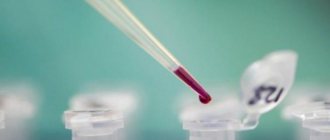HCG (human chorionic gonadotropin) is a hormone released during pregnancy. Using a laboratory blood test, the concentration of beta subunits is determined. Conception can be detected using this method as early as 6-8 days. The hCG test also differentiates a normal pregnancy from an ectopic one. The online hCG calculator will help you decipher the blood test. You will be able to track the dynamics of hormone growth indicators and be able to determine the duration of pregnancy.
APPOINTMENT WITH A GYNECOLOGIST - 1000 rubles. CONSULTATION WITH A GYNECOLOGIST ON THE RESULTS OF AN ULTRASOUND AND ANALYSIS - RUB 500!
CLICK TO SIGN UP
What is hCG - “beta”?
The content of the article
HCG is a hormone that is produced by the fetus itself, or rather by the fetal membrane of the embryo (chorion). The process begins immediately when the embryo is implanted into the uterus. At this moment, the fetus still looks like a small bubble of liquid, consisting of an embryoblast (from which the fetus will form in the future) and trophoblast (cells that form the chorion).
Under the influence of gonadotropin, the corpus luteum produces hormones that maintain the condition of the endometrium (the inner lining of the uterus) necessary for normal pregnancy. An increase in hCG concentration indicates that fertilization has taken place.
HCG contains:
- Alpha subunits. They are not determined because they have no diagnostic value during pregnancy.
- Beta subunits, which make it possible to determine the fact of conception and the period of fetal development.
That is why the term human chorionic gonadotropin in pregnancy tests refers to its beta component.
Biological properties
In terms of biological functions, hCG is similar to luteinizing and follicle-stimulating hormones. It binds to both types of gonadotropic receptors, but is significantly superior to gonadotropins in biological activity. Thanks to hCG, the corpus luteum functions for up to 12 weeks, instead of the usual two. After 12 weeks, the placenta forms, producing estrogen and progesterone. In addition, hCG stimulates the production of female sex hormones and weak male hormones in the ovarian follicles.
There is evidence that human chorionic gonadotropin activates the synthesis of steroids by the adrenal cortex. This can help the body adapt to pregnancy as stress, suppress the function of the immune system and prevent fetal rejection. The data are confirmed by the fact that corticotropic hormones produced in the pituitary gland do not have such properties.
Another function of human chorionic gonadotropin is to maintain placental function. The hormone improves the nutrition of the organ and increases the number of chorionic villi. An injection of the hormone in the middle of the cycle increases the production of estrogens and progesterones, promotes ovulation and the formation of the corpus luteum. In men, a synthetic hormone stimulates the production of sperm and androgens. An increase in hCG in the absence of pregnancy indicates a malignant disease.
How do hCG levels change during pregnancy?
For the first time, an increase in beta-hCG levels is detected starting from the sixth day after conception. At first, the concentration of the hormone doubles every two days. Further, the increase in hCG concentration slows down and when the level reaches 1200 mU/ml, doubling begins to occur every 72-96 hours. Upon reaching 6000 mU/ml, growth occurs every 96 hours.
The concentration indicator is not just boring numbers: it is what helps determine the gestational age.
After 11 weeks, the hormone in the body becomes less, but its level is still increased. At 34 weeks, a second increase in hCG occurs. This surge, according to scientists, triggers labor. After childbirth, the level of beta-hCG in the blood gradually decreases.
HCG: the main test for pregnant women
One of the main tests during pregnancy is the hCG test. What role does this hormone play in the body? What is the essence of the analysis? Maria Aleksandrovna Petrova, an obstetrician-gynecologist at the Expert Clinic Smolensk, answered these and other questions.
– Maria Alexandrovna, what is hCG?
– HCG (human chorionic gonadotropin) is a hormone that is normally produced only in the body of a pregnant woman and nowhere else. In other words, it does not occur normally in non-pregnant women, men, children, and the elderly.
The hormone is produced by chorion tissue. This is one of the leaves of the future embryo. When a zygote (fertilized egg) is formed, hCG can be detected in a woman’s blood approximately on the sixth day after conception.
– What functions does this hormone perform in the human body?
– HCG is a very important hormone. It regulates the functioning of a woman’s entire body in the first trimester of pregnancy. Firstly, under the influence of hCG, the corpus luteum, which is formed in every cycle in a woman and disappears 10–12 days from the moment of its formation, in this case does not disappear anywhere, but actively functions up to 10–12 weeks. The corpus luteum, as we know, produces progesterone, which must be sufficient in a woman’s body to maintain normal growth and development of pregnancy. And until the placenta takes over the function of producing progesterone, it is performed by the corpus luteum, which cannot exist for long without hCG.
Secondly, to some extent, human chorionic gonadotropin has corticotropic properties, increasing the production of hormones (in particular, cortisol) in the adrenal cortex and promoting functional hyperplasia of the adrenal cortex in a pregnant woman.
During pregnancy, the entire body begins to live its own life: the third circle of blood circulation (placenta-fetus) is formed, the entire musculoskeletal system begins to be rebuilt. This is a significant stress for the body that a woman must cope with. And cortisol helps her with this.
Read more about the adrenal glands in our article
In addition, thanks to hCG, a woman’s immune system is physiologically weakened, which is also very important. After all, fifty percent of the unborn child is foreign material for our body. And if immunity does not decrease, then, unfortunately, miscarriages occur.
– What types of hCG tests are there? What is their essence?
– The two main tests for hCG are qualitative and quantitative. A qualitative analysis is performed to determine whether there is a pregnancy or not. And thanks to quantitative analysis, you can judge how the pregnancy is developing. Normally, hCG should increase two to three times every two to three days.
Two main tests for hCG -
it is qualitative and quantitative
– Maria Alexandrovna, when does a doctor prescribe a hCG test?
– The main indication is to find out whether there is a pregnancy in the body or not. The test may not yet show pregnancy, and the ultrasound may not yet show the fertilized egg, but hCG will definitely answer this question for us.
We also prescribe this test for menstrual irregularities and any abnormal uterine bleeding in order to exclude pregnancy. Without the presence of hCG we cannot do this.
And, of course, we prescribe hCG when we monitor the progress of pregnancy.
In addition, there are, for example, oncological diseases, such as chorionic carcinoma or hydatidiform mole, which will also be accompanied by the production of hCG. Determination of this marker is one of the tests performed in the diagnosis of these diseases.
– What does an elevated hCG mean?
– It is very difficult to say which hCG levels are elevated and which are reduced during pregnancy. Because if we look at the table of limits of normal values for each stage of pregnancy, they are very wide. But if we say that the numbers are inflated in several consecutive analyses, then this may indicate, for example, a multiple pregnancy.
In addition, hCG may increase when there is a threat of miscarriage, in the presence of diabetes mellitus, or certain cancer diseases.
– What does a low hCG level indicate?
– Here it is more correct to talk not about a low level of hCG, but about a slow increase in hCG. Most often it occurs during ectopic (ectopic) pregnancy, when it is not located in the uterus, but in the tube, ovary or abdominal cavity.
More information about ectopic pregnancy can be found here
HCG will also increase more slowly during anembryony (non-developing pregnancy), when there is a fertilized egg, but there is no embryo in it.
These are the main points when hCG is low.
– How to take hCG? Is any preparation needed?
– Blood is donated for hCG strictly on an empty stomach. Preferably in the morning. The day before, as with any blood donation from a vein, it is advisable not to drink alcohol, fatty, fried, or spicy foods.
You may also be interested in our materials on other types of analyzes:
How to properly take a general blood test?
Leukocytes. What will a blood test tell you?
Platelets: friends or enemies?
What does a biochemical blood test show?
Not only a colonoscopy: what will a stool test tell you?
Diagnosis of infections using PCR: what is it?
– How accurate is the hCG blood test?
– If we are talking about a qualitative analysis for hCG, then this is the gold standard for detecting pregnancy. Nothing more accurate than hCG will tell us whether a woman is pregnant or not. If we talk about quantitative analysis, this is also a fairly objective research method that allows you to track whether the pregnancy is developing well or whether there are any difficulties.
You can make an appointment with an obstetrician-gynecologist here
ATTENTION: the service is not available in all cities
Interviewed by Marina Volovik
The editors recommend:
On your marks! What tests need to be taken when planning a pregnancy?
Preparing for pregnancy: necessary diagnostics
Do not count your chickens before they are hatched. What time of year should you plan to get pregnant?
For reference:
Petrova Maria Alexandrovna
Graduate of the Faculty of Medicine of the Smolensk State Medical Academy in 2011.
From 2011 to 2013 she completed a residency in obstetrics and gynecology.
Currently, he is an obstetrician-gynecologist at the Expert Clinic, Smolensk.
Receives at the address: st. 8 March, no. 20
Online hCG calculator
The calculator will help you when deciphering blood tests for hCG. You will be able to monitor the growth dynamics of Beta-hCG and determine the duration of pregnancy.
The results indicated in the tables and the hCG calculator itself are approximate. To determine this hormone, various methods can be used and indicators may vary. Therefore, the analysis is deciphered where it was done. The units of measurement for the concentration of beta-hCG are also different. The concentration is indicated in honey/ml, mIU/ml, U/l and IU/l as well as U/l mIU/ml, IU/l. All indicators are the same and do not need to be recalculated. U stands for units, IU stands for international units, mIU/ml and U/l are the English display of units.
Treatment tactics
Based on the results of the study, the doctor develops further treatment tactics.
Pregnancy support is canceled in the following cases:
- human chorionic hormone level is negative;
- the level of chorionic hormone is reduced; ultrasound examination does not detect the fertilized egg.
Further administration of synthetic hormones in such cases will negatively affect the menstrual cycle, while the woman could be preparing for the next protocol. If the indicators are normal, and a developing fertilized egg is visualized on ultrasound, pregnancy is supported, and studies are repeated regularly, according to the drawn up scheme. If the level of human chorionic gonadotropin is elevated, the woman should be further examined. An ultrasound examination, laboratory tests, and genetic consultation are prescribed. The decision to carry such a pregnancy is made strictly individually, based on the results of examinations.
Beta-hCG levels at different stages of pregnancy
| Days after last menstruation | Gestation period (days/weeks) | HCG in honey/ml |
| 26 | 12 | 0-50 |
| 27 | 13 | 25-100 |
| 28 | 14 (2 weeks) | 50-100 |
| 29 | 15 | 100-200 |
| 30 | 16 | 200-400 |
| 31 | 17 | 400-1000 |
| 32 | 18 | 1050-3000 |
| 33 | 19 | 1450-4000 |
| 34 | 20 | 1940-5000 |
| 35 | 21 (3 weeks) | 2600-6500 |
| 36 | 22 | 3400-8500 |
| 37 | 23 | 4400-10800 |
| 38 | 24 | 5700-13700 |
| 39 | 25 | 7200-17000 |
| 40 | 26 | 9000-21000 |
| 41 | 27 | 10100-23300 |
| 42 | 28 (4 weeks) | 11200-2550 |
| 43 | 29 | 13700-30900 |
| 44 | 30 | 16600-36500 |
| 45 | 31 | 19900-43000 |
| 46 | 32 | 25500-50200 |
| 47 | 33 | 27450-57650 |
| 48 | 34 | 31700-65400 |
| 49 | 35 (5 weeks) | 36100-73200 |
| 50 | 36 | 40700-81150 |
| 51 | 37 | 45300-88800 |
| 52 | 38 | 49800-96000 |
| 53 | 39 | 54100-102500 |
| 54 | 40 | 58200-108200 |
| 55 | 41 | 61640-112800 |
| 56 | 42 (6 weeks) | 64000-116310 |
HCG norm by week
| pregnancy*: | HCG, IU/l |
| 1 Week | 5,3 — 50 |
| 2 weeks | 50 — 500 |
| 3 weeks | 101 — 4870 |
| 4 weeks | 1110 — 31500 |
| 5 weeks | 2560 — 82300 |
| 6 weeks | 23100 — 151000 |
| 7 – 8 weeks | 27300 — 233000 |
| 9 – 11 weeks | 20900 — 291000 |
| 12 – 16 weeks | 6140 — 103000 |
| 17 – 21 weeks | 4720 — 80100 |
| 22 – 39 weeks | 2700 — 78100 |
* - the obstetric gestational age is indicated (based on the last menstruation).
Concentration of chorionic gonadotropin at later stages
| Duration in weeks | HCG concentration honey/ml |
| 7 | 65000 — 155000 |
| 8 | 67500 — 190000 |
| 9-10 | 70000 — 211000 |
| 11-12 | 13500 — 63000 |
| 13-14 | 1200 — 71000 |
| 15-25 | 8000 — 60000 |
| 26-37 | 5000 — 55000 |
HCG diagnostic methods
To determine this hormone, high-quality reagents are used. The further correct tactics of doctors’ actions depend on determining its concentration. Therefore, ultra-precise research methods are used to diagnose it. Moreover, the more accurate the method, the more different factors that influence the final diagnostic result. Thus, when donating this hormone, it is necessary to comply with all conditions both at the stage of preparation and donation itself, and during laboratory testing of blood plasma.
Why is a beta-hCG blood test more sensitive than a drugstore test?
Pregnancy tests are not accurate for the following reasons:
- The concentration of hCG in urine is almost two times lower than in the blood, so even the most sensitive test will give a false negative result in the early stages.
- Human chorionic gonadotropin tests sold in pharmacies are capricious and may not work correctly. Reasons: inaccurate analysis, expired reagent, improper storage of the test.
- If you drink a lot of water in the evening or take a diuretic, the test will not detect pregnancy. Tests also give false negative results for kidney diseases.
Every year there are thousands of mothers in the world who for a long time did not imagine their “interesting situation”, trusting pharmacy strips.
Deviations
Sometimes pregnancy may not develop, but a hydatidiform mole occurs - the growth of chorionic villi in the form of bubbles with liquid contents. At the same time, human chorionic gonadotropin also increases, which can be mistaken for the presence of pregnancy. In this case, the patient must undergo ultrasonography and other studies to make an adequate diagnosis and eliminate the drift, since it can transform into a malignant tumor if treatment is not carried out in time.
HCG variability can mean different conditions when indicated:
| Understated | Overpriced |
| Ectopic pregnancy | Incorrect determination of gestational age |
| Incorrect deadline | Multiple pregnancy - twins, triplets, especially fraternal ones. Heterozygous twins have their own placenta, each of which intensely secretes the hormone |
| The fetus is delayed in development | Chromosomal mutations (high probability of Edwards Syndrome). If the hormone increases in the second trimester, then Down syndrome is possible |
| Risk of miscarriage | Diabetes mellitus in an expectant mother |
| Placental insufficiency | Preeclampsia |
| Non-developing pregnancy | Taking synthetic progesterone |
| Post-maturity | Early toxicosis |
| Intrauterine death of a child | |
| After in vitro fertilization, conception did not occur or the embryo did not implant |
How is a human chorionic gonadotropin test taken?
For the analysis, blood from a vein is needed in the morning on an empty stomach. Measurement of beta-hCG concentration is performed no earlier than 3-5 days after a missed period. When taking hormones, you need to inform your doctor about this - they can affect the concentration of hCG.
To diagnose congenital pathologies (perinatal screening), an hCG test is performed at 14-18 weeks. Determination of hCG in men and non-pregnant women (analysis for tumor markers) can be carried out on any day.
Preparing to donate blood for hCG levels
The results of the study will correspond to reality only if the woman is properly prepared for taking it. Blood for analysis is taken from the cubital vein. The study may require at least five milliliters of liquid.
Two days before donating blood, a woman should change her diet. Fried and fatty foods, smoked meats, pickles and marinades are excluded from the menu. Dishes must be dietary and not contain spicy seasonings. At the same time, you must stop drinking alcohol and stop smoking two hours before donating blood. If a woman is taking any pharmaceutical drugs, she should warn the laboratory technician about this.
Blood is donated in the morning, on an empty stomach. If it is not possible to carry out the procedure in the morning, then the break between the last meal and venipuncture should be at least six hours. Only then will it be possible to correctly interpret the results of the analysis.
The concentration of beta-hCG is different from the norm, what does this mean?
The online hCG calculator only works to determine pregnancy. If pregnancy is not confirmed and there are no other signs of pregnancy, you need to make an appointment with an oncologist. An increase in the hCG hormone can occur in both non-pregnant women and men. This indicates malignant tumors of the uterus (chorionepithelioma, chorionic carcinoma) or testicles. An increase in the hormone is also observed in cancer of the bladder, kidneys, intestines, and lungs.
| Excess hCG | Decreased hCG |
| Multiple pregnancy. In case of twins or triplets, the level is proportional to the number of embryos | Risk of miscarriage |
| Toxicosis | Death of an embryo or fetus |
| Down syndrome (more research needed) | Frozen pregnancy |
| The term is incorrectly defined | Placental insufficiency |
| Post-term pregnancy | |
| Ectopic pregnancy | |
| Hydatidiform mole | |
| Pregnancy after stimulation or IVF |
If a high level of hCG persists after an abortion, this indicates an incomplete abortion - incomplete removal of the fertilized egg or an ongoing pregnancy. Gonadotropin levels also increase when taking hormonal medications.
When should you take a β-hCG test?
For women:
early diagnosis of pregnancy; prenatal screening of fetal development pathologies; amenorrhea; diagnosis and control of treatment of trophoblastic pathologies; dynamics of chronic placental insufficiency; suspicion of threatened spontaneous abortion or frozen pregnancy; suspicion of ectopic attachment of the embryo; monitoring the course of pregnancy over time; control over the implementation of artificial abortion. For men:
differential diagnosis of testicular tumors.
The role of the hormone in diagnosing pregnancy
Analysis of the amount of total hCG occupies a special place in confirming pregnancy in the early stages. This is due to the fact that the hormone begins to be actively released a few days after the fertilized egg attaches to the wall of the uterus. During normal development of the embryo, the level of the substance doubles every 1.5-2 days. By the tenth week, the amount of hCG in a woman’s tests can reach maximum values - up to 225,000 mU/ml.
Simultaneously with blood tests for total hCG, the pregnant woman is also prescribed other examinations. So the patient must visit the ultrasound scanning room at least three times. Several studies may be required over a period of nine months. Comprehensive 1st and 2nd trimester screenings also include an hCG test.










